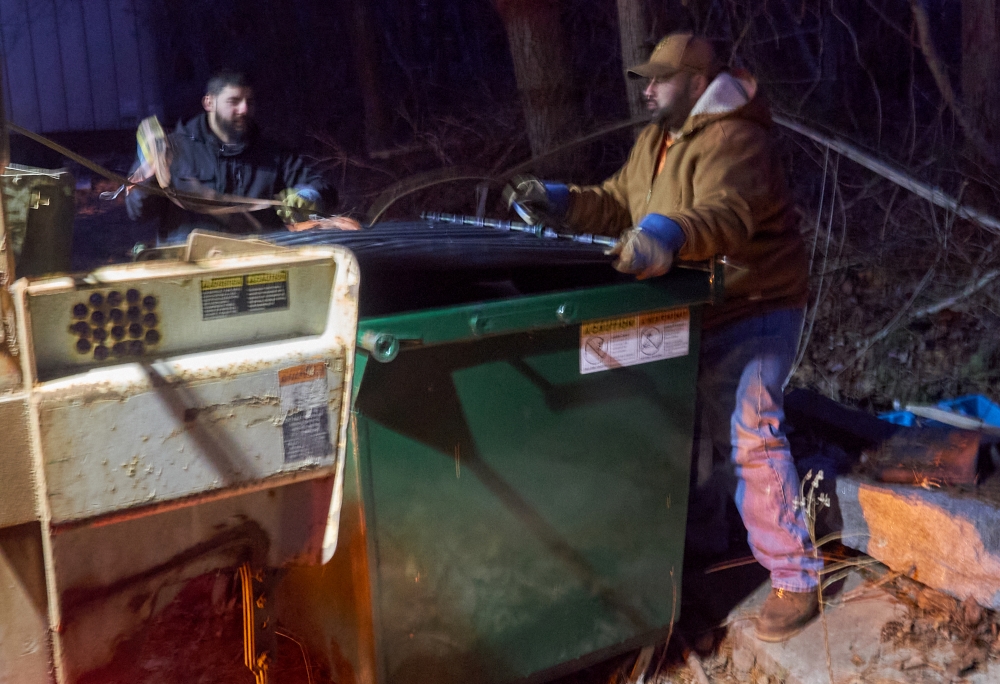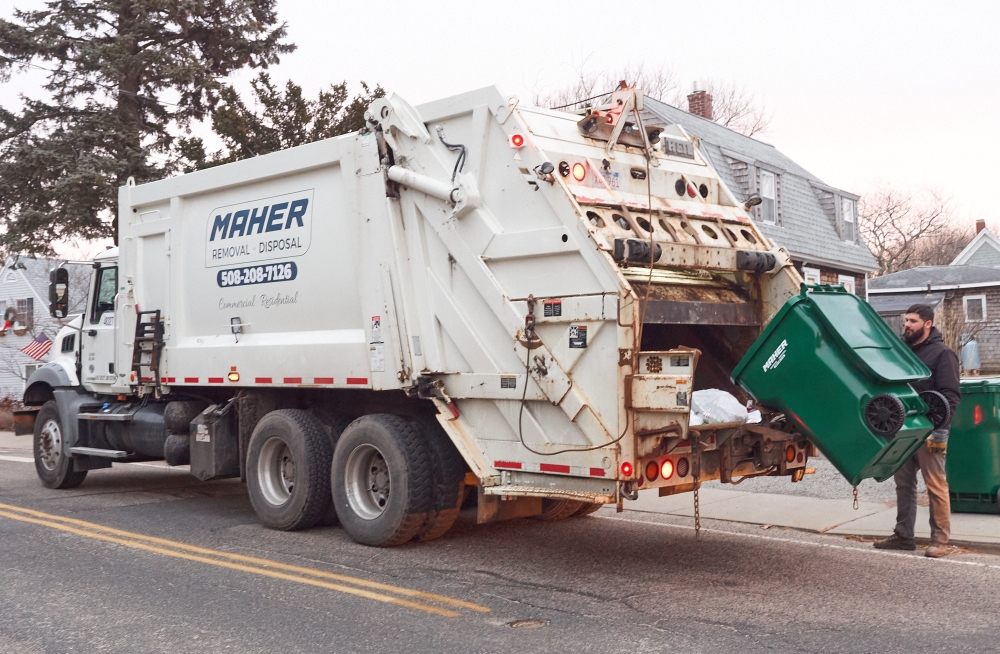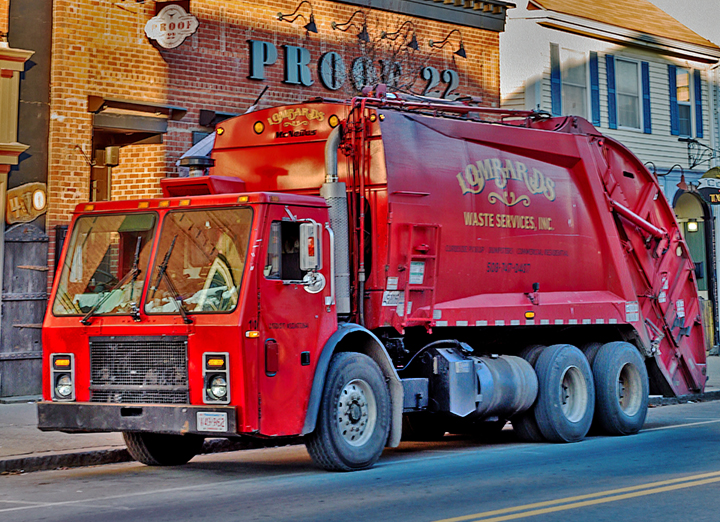Do you know where your waste hauler dumps your household trash and recyclables? Are you wasting your time and effort by separating household waste in trash and recycling bins? And what about the hauling companies that tell you to just dump it all into one container?
Don’t worry, your recycling efforts may not be pointless. But there are reasons to be concerned about what happens to Plymouth’s many tons of weekly disposables. For starters, determining whether your hauler is taking recyclables to a state-approved recycling facility can be daunting.
As of Tuesday, the Town of Plymouth’s website listed eight commercial waste and recyclable haulers approved by the public health department. Before this week, however, the list was fraught with non-working phone numbers and included one hauler whose name had since changed. It was updated after a reporter brought it to the attention of town Health Director Karen Keane.
One of the approved haulers, Lombard’s Waste Services Inc., picks up trash and recyclables in a single truck and dumps them at a facility in West Wareham. Recyclables cannot be sorted in a single truck unless it has compartments for both waste and recyclables, which Lombard’s trucks lack, according to the town. It does not issue separate recycling bins to customers.
Keane readily admitted that Lombard’s is in violation of town regulations and that it is working to bring the locally-owned company into compliance.
“Our regulations require that haulers perform both waste removal and recycling,” Keane noted. “If they can’t do both, we will have to withdraw their license to operate in Plymouth.” She did not say how much time Lombard’s will be given to comply with the rules.
Lombard’s, like six other haulers on the old list – the one the town had posted for years – did not return phone calls and emails seeking comment on their recycling protocols. Of the eight companies on that list, only Maher Removal & Disposal responded to questions.

Dependable Disposal, which is on the new list, picks up and recycles in
separate trucks, said owner Ray Silva. Trash goes to SEMASS – a West Wareham trash facility that burns waste to produce energy – and
recyclables go to New Bedford Waste, a materials recycling facility in
Rochester.
United Hauling, also on the updated list, now goes by the name Win-Waste
Innovations (although the listing does not reflect that change). An employee who answered the phone there said it takes trash and
recyclables in a single “split body” truck and disposes of the loads
separately.
Another company on the updated list, Cavossa Disposal Corp., did not
immediately return a call seeking comment.
Keane said that haulers doing business in Plymouth must report their trash tonnage and recycling tonnage every quarter.
“These reports also contain the names of both the facility that accepts the trash and the recycling,” she said.
Failure to submit accurate reports may result in the loss of license to operate in Plymouth, she said. Reports would be difficult for haulers to doctor, since they must jive with the drop-off facilities’ records, Keane added. No hauler has yet lost their town license, she said.
The Department of Public Health has issued fines to three haulers due to late filing of tonnage reports, Keane said. “No further action was taken because the reports have been correctly submitted since then.”
The Lombard’s issue is not the only flaw with local recycling. Most contracted haulers drop their waste at SEMASS. But skeptics point out that waste-to-energy plants have their own issues.
For more than 30 years, Massachusetts has banned construction of new waste incinerators, including waste-to-energy facilities, because of environmental and health concerns that are echoed by the American Lung Association. Environmentalists believe that the ash, or sludge, from waste-to-energy incinerators is toxic.
“While cleaner than burning coal, burning trash is the least acceptable way of generating energy,” said Sustainable Plymouth’s Ken Stone, who heads the volunteer organization’s solid waste and plastic reduction group.

SEMASS says that that it helps reduce dependence on fossil fuel by burning trash to generate energy from the combustion of municipal solid waste, producing electricity to power homes and businesses.
“On one level, it sounds like it makes sense,” Stone said, “but when you dig deeper, there are problems.” Burning trash to help create energy “is not the panacea that SEMASS depicts it to be,” he said. “As with everything related to recycling or the environment, it’s complicated.”
A SEMASS official said trash is burned to create energy through a much cleaner process than fossil fuel-fired energy plants. Covanta, SEMASS’s parent firm, said its “sustainable waste systems do more than keep trash out of landfills. Each year, our facilities produce enough energy to power one million homes, helping end our dependency on climate-damaging fossil fuels.”
Michael Maher, who owns Maher Removal and Disposal, said his trucks take “comingled recyclables” to New Bedford Waste Services, a Materials Recovery Facility – or MRF – in Rochester. Comingled simply means that residents can mix all types of recyclables in a single recycling bin. The materials are then sorted at the MRF and baled, to be picked up by various recyclers.
Separate Maher trucks carry Plymouth trash to the SEMASS plant in West Wareham.
As mentioned earlier, other haulers may use trucks that carry both trash and recyclables, which are kept separate, to be dropped off at separate facilities.
That’s why it’s important to make sure to ask the town whether your hauler is disposing of waste and recyclables separately, and to find out where they are taking them.
Plymouth residents have two options to get rid of household waste and recyclables, said James Downey, the town’s assistant director of public works:
- They can hire a private hauler, approved by the town’s Health Department.
- They can bring trash and recyclables to the Manomet Transfer Station on Beaver Dam Road through the town’s “pay-as-you-throw” program. Residents pay $190 annually for one vehicle, plus the cost of the disposal bags for trash and recyclables. You must separate trash and accepted recyclables, dropped at several stations: mixed paper, cardboard, newspaper, glass, and comingled.
“In addition, other items like TVs, computer monitors, certain household appliances, propane tanks, antifreeze, motor oil, car batteries, car tires, grass clippings and leaves need to be kept completely separate, and may require additional fees per item,” Downey explained.
Trash brought to the Manomet transfer station goes to SEMASS in West Wareham. “I don’t believe we are mandated to take it there, but it is an approved location, and based on its proximity and cost, it is currently our best option,” Downey said. “It is not feasible to take trash to landfills”.
“We have knowledgeable staff at the (Manomet) station that are there to help direct residents and answer questions on what to separate, what we take, and what we do not take,” he said. “Recycling is an area that we would love to help educate the general public. The more that residents know, the better things will go.”
But how much of your recyclable material really gets put to good use through recycling? And what about China’s ban on American recyclables put into place five years ago – has it made recycling unattractive to haulers? Those questions and more will be addressed in a future column. This will include helping you determine what is recyclable. As mentioned earlier, it is a complicated issue.
Steven Feldman is a real estate agent for Keller Williams Realty, a renovator of Plymouth-area properties, and a former Boston journalist.

